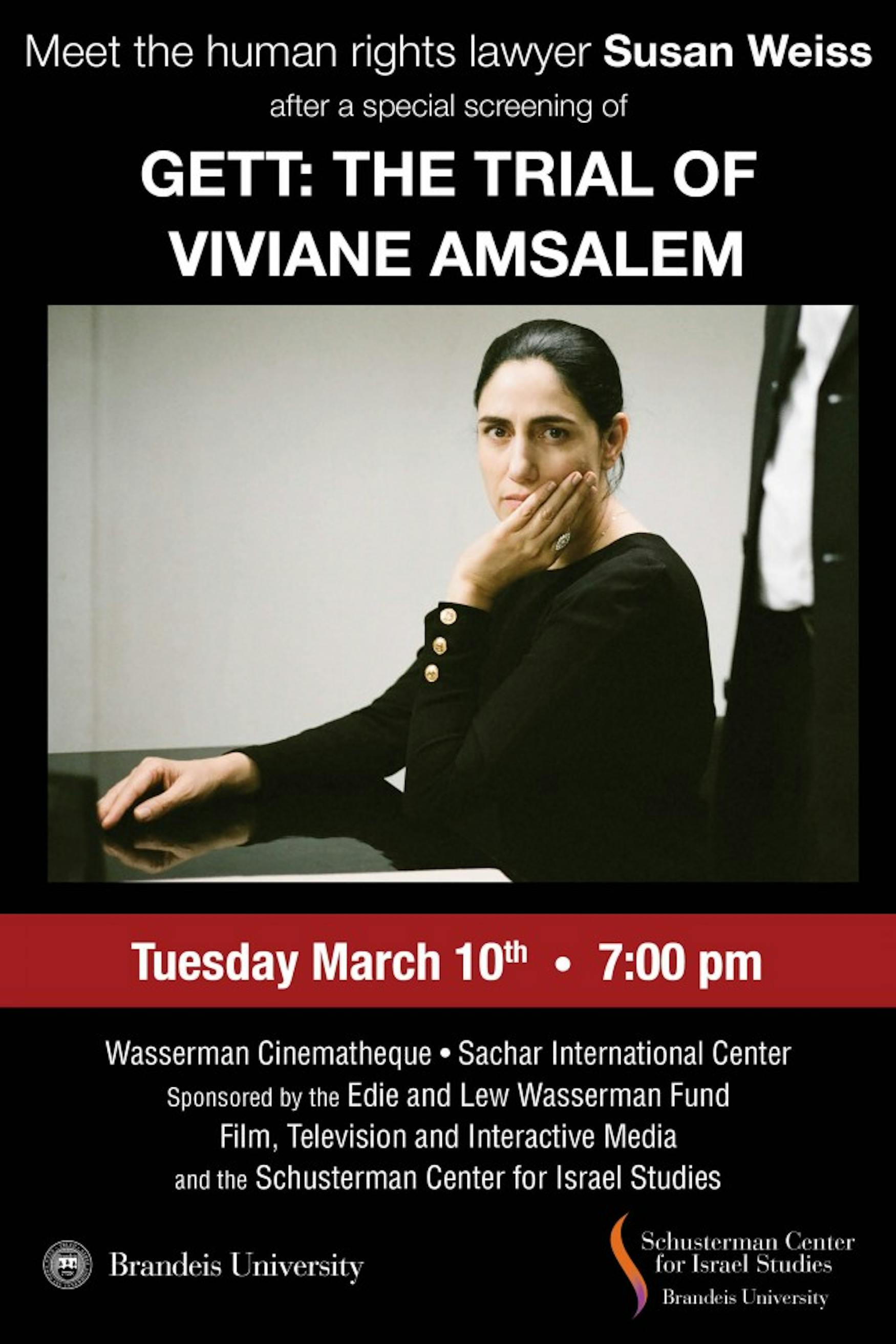Divorce as a human right
A film on the divorce process in Israel sparks conversation
Last Tuesday night, the International Business School was bustling with students, faculty and community members from the greater Boston area who came to see the screening of Gett: The Trial of Viviane Amsalem with a special talk by human rights attorney Susan Weiss.
The Israeli-French drama directed by Ronit and Shlomi Elkabetz addresses a growing human rights issue in Israel by depicting how difficult it is for a Jewish woman to get a divorce. The film was shown at the 2014 Cannes Film Festival, the 2014 Toronto International Film Festival and was nominated for the Best Foreign Language Film at the 72nd Golden Globe Awards.
The film depicts an Israeli woman, Viviane Amsalem, who fights for five years to obtain a divorce from her husband. Her husband, Elisha, refuses to grant his wife permission to end their marriage, and the film highlights the lack of power many Jewish women have in the divorce process.
The film, which is in French and Hebrew with English subtitles, was brought to Brandeis by the Film, Television and Interactive Media Program. The Film, Television, and Interactive Media program partnered with the Schusterman Center for Israel Studies to bring the film to campus 10 days before its official release to the Boston community.
One of the Film, Television and Interactive Media Undergraduate Departmental Representatives, Ethan Stein ’15, helped bring the film to campus.
The film was selected as Israel’s entry “for the best foreign language film [at the 87th Academy Awards] because of its political acclaim for dealing with a complex and delicate topic that vexes Israeli society,” Stein explained in an email to the Justice.
Stein emphasized his hope that this film screening would help bring awareness to the complicated nature of divorce proceedings in Israel. “This event, I hope, will lead to further discussion of its troubling topic: the abuse of the gett (Jewish divorce) process,” Stein wrote.
The film defines a “gett” as a Jewish divorce document that a husband must present to his wife in order to legalize their divorce.The film depicts this when Elisha places the gett in Viviane’s cupped hands and tells his wife, “You are hereby permitted to all men.” This finalizes the divorce process and indicates that his wife is no longer a married woman and is free to do as she wishes.
Weiss, who has worked with hundreds of women like Viviane to help find solutions for divorce issues, spoke after the film screening. Weiss has also founded two non-governmental organizations—Yad L’Isha and the Center for Women’s Justice. She explained that “everything [depicted in the film] is unfortunately true” and that the issues raised in the film are very relevant to many Jewish women living in Israel today.
All Jews in the State of Israel who are married to each other have to go to the rabbinical court in order to get divorced, no matter how religious they are.
After the screening, Weiss explained that there is no secular or civil court that can deal with the issue of divorce in the state of Israel. Instead, the court consists of a panel of rabbis who base their decisions on the customs of Jewish law.
The film emphasizes how lengthy and tedious a divorce process in Israel can be with subtitles telling the audience, “two months later,” “three months later” and “six months later” as time is wasted when Elisha repeatedly fails to appear in court.
Husbands who fail to cooperate with the rabbinical court are sometimes jailed in Israel to encourage them to give their wives a gett.
The rabbis in the film show favoritism towards the husband by humorously threatening to take Elisha’s nonexistent drivers license away after he fails to appear in court several times. This further illuminates how helpless Viviane and other women are in the divorce process, as they are at the mercy of their husbands.
The film also portrays the stigma around divorce for women in Israel when the rabbis plead for Viviane to return home to her husband.
Many of the witnesses who testify in their divorce case describe Elisha as an upstanding citizen and hence the court finds it difficult to understand why Viviane wants to divorce her husband.
Weiss has worked on many similar cases and she emphasized, “I don’t want to put men in jail because I don’t think that’s the way marriages should end. I think that is a human rights violation. I don’t think correcting one human rights violation with another is the way to go.”
Weiss went on to further explain, “In my opinion, we have to end this religious way of getting married as a requirement of the state. It has to be something that is voluntary. We have to have civil marriage and divorce.” She acknowledged that the situation is complicated.
When asked what advice she would give a young woman getting married in Israel today, Weiss recommended signing a halakhic, a financial prenuptial agreement in accordance with Jewish law.
Many who attended the screening agreed that the film was important to show at Brandeis because it helps start a conversation about a relevant issue in today’s world for Jewish women.
Tova Perlman ’18 called the film “excellent,” explaining that she thought “it is very relevant to living in Israel.”
Prof. Jonathan Sarna (NEJS) brought his class to the film screening because he believes that, as future Jewish leaders, this is an important topic for his students to be knowledgeable about.
A student who attended the screening, Tobey Linhart ’18, praised the film for its accuracy in depicting how difficult it is for a woman to obtain a gett in Israel.
“As an Orthodox woman approaching marriage age, this is something a lot of us are thinking about,” Linhart said.



Please note All comments are eligible for publication in The Justice.